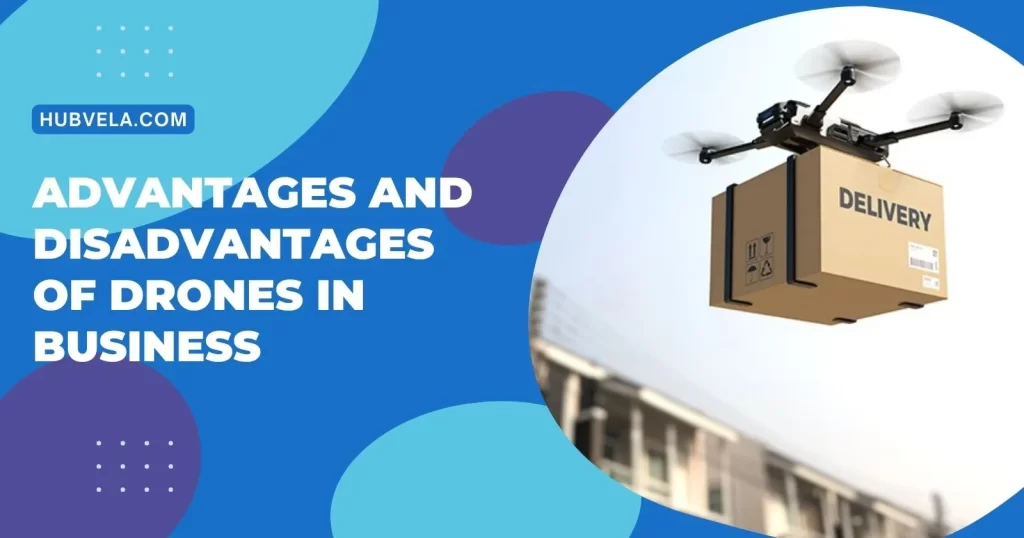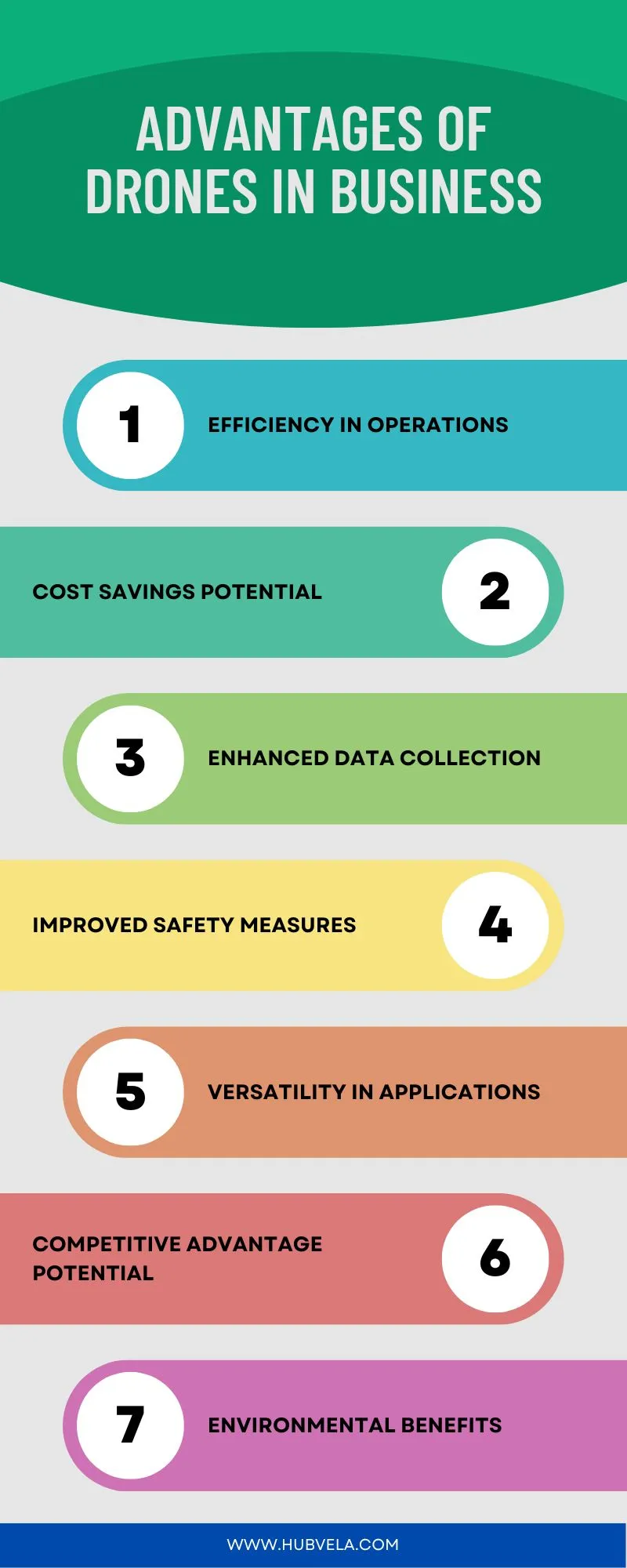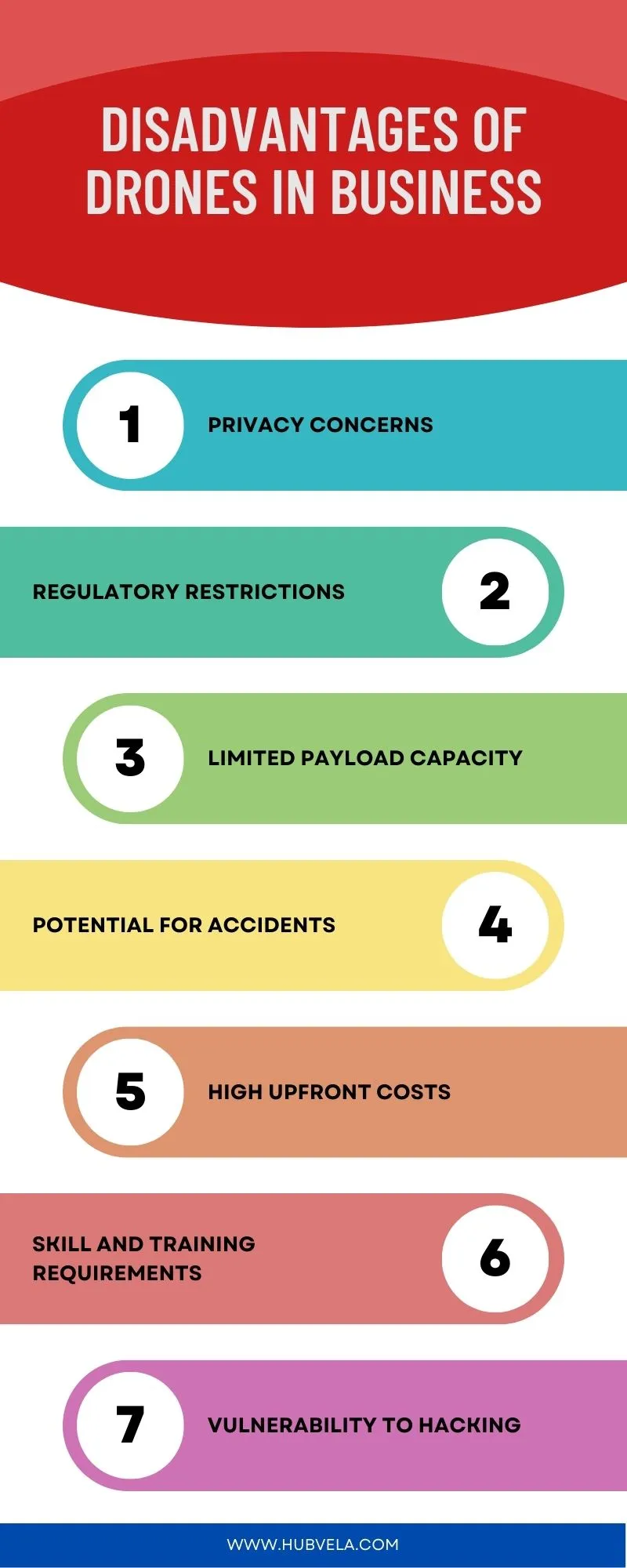In today’s fast-paced business world, staying ahead of the competition requires embracing innovative technologies. One such technology that has gained considerable attention is drones.
These unmanned aerial vehicles have the potential to revolutionize various aspects of business operations. However, like any other technological advancement, drones come with their own set of advantages and disadvantages.
So, what exactly are the advantages and disadvantages of drones in business? Strap in as we explore the possibilities and pitfalls of incorporating drones into your business strategy.

--Advertisement--
Advantages of Drones in Business
Drones offer various advantages in the business world. They can be equipped with advanced technology such as imaging, infrared cameras, and GPS, making them valuable for tasks like delivery, monitoring, and surveillance. Some of the key benefits of drones in business include:

1. Efficiency in Operations
Drones in business improve efficiency in operations by streamlining tasks and increasing productivity. With improved productivity, streamlined processes, and time savings, drones offer a cost-efficient solution for businesses.
By optimizing resources and reducing human error, drones can perform tasks more accurately and efficiently than traditional methods. They can cover large areas in a shorter amount of time, making them invaluable for industries such as agriculture, logistics, and construction.
The use of drones ultimately leads to improved operational efficiency and overall business performance.
2. Cost Savings Potential
By streamlining tasks and increasing productivity, drones in business offer significant cost savings potential.
Drones can help overcome operational challenges in various industries by providing efficient solutions. For example, in aerial photography, drones eliminate the need for expensive equipment and manpower, resulting in reduced costs.
Similarly, drones can revolutionize delivery services by enabling faster and cheaper deliveries.
In inventory management, drones can perform stocktaking and monitoring, reducing labor costs.
Additionally, drones have proven beneficial in agricultural applications, optimizing crop spraying and surveillance, leading to cost savings.
3. Enhanced Data Collection
To further explore the benefits of drones in business, let’s now focus on their ability to enhance data collection.
Drones equipped with remote sensing technology allow for accurate data gathering from various sources. Real-time monitoring capabilities enable businesses to collect data in a timely manner. This data can then be analyzed to gain valuable insights and make informed decisions.
Additionally, drones provide aerial surveillance, giving businesses a bird’s eye view of their operations and enhancing data collection capabilities.
4. Improved Safety Measures
With enhanced maneuverability and advanced technology, businesses can significantly improve their safety measures by incorporating drones into their operations.
Drones provide improved surveillance capabilities, allowing businesses to monitor their premises and assets more effectively.
In search and rescue missions, drones enable faster response times and enhanced monitoring, increasing the chances of locating individuals in need.
Furthermore, drones reduce human error as they can perform tasks with precision and accuracy, minimizing the risk of accidents and injuries.
5. Versatility in Applications
Now let’s explore the versatility of drones in various business applications, leveraging their advanced technology and maneuverability to drive efficiency and effectiveness in operations.
Drones are revolutionizing industrial inspections, allowing businesses to remotely monitor and assess infrastructure, reducing the need for manual inspections and enhancing worker safety.
They’re also being utilized in search and rescue operations, enabling quick and efficient aerial surveillance in challenging terrains.
In agriculture, drones are used for monitoring crops, identifying areas that need attention and optimizing yields.
Additionally, drones are being employed in delivery services, revolutionizing the transportation industry.
Lastly, drones are transforming the field of filmmaking and photography, providing unique aerial perspectives and capturing breathtaking shots.
6. Competitive Advantage Potential
By leveraging drones in your business operations, you can gain a competitive advantage through increased efficiency, improved productivity, and enhanced cost-effectiveness.
Drones allow you to stay ahead in market competitiveness by offering strategic differentiation. Their technological innovation enables you to streamline processes and achieve operational efficiency.
Moreover, drones enable you to deliver faster and more accurate services, leading to increased customer satisfaction.
Embracing drones in your business will give you the edge you need to outperform your competitors.
7. Environmental Benefits
To further explore the benefits of drones in business, let’s now focus on the positive impact they’ve on the environment.
Drones contribute to reduced emissions by replacing traditional vehicles for tasks like wildlife monitoring, precision agriculture, and disaster response.
They can also be used for remote sensing, allowing businesses to gather valuable data without disturbing the natural surroundings.
Disadvantages of Drones in Business
Drones have become increasingly popular in various industries, including business. While there are many advantages to using drones, such as cost-effectiveness, improved access, and reduced risk, there are also several disadvantages to consider. Some of the main drawbacks of using drones in business include

1. Privacy Concerns
Privacy concerns are a significant drawback of using drones in business operations. The use of drones raises questions about data privacy, legal implications, public perception, and ethical considerations.
With drones equipped with cameras and other sensors, there’s a potential for invasive surveillance and unauthorized data collection. This can lead to breaches of personal privacy and the misuse of sensitive information.
Furthermore, the public may perceive drone technology as intrusive, leading to negative perceptions of businesses that use them.
2. Regulatory Restrictions
Businesses that utilize drones face significant disadvantages due to regulatory restrictions. One major challenge is ensuring regulatory compliance, as there are strict rules and guidelines that must be followed. Failure to adhere to these regulations can result in legal implications for businesses.
Airspace restrictions often limit where drones can operate, hindering their potential reach. Flight restrictions further restrict the use of drones in certain areas.
Licensing requirements add another layer of complexity, requiring businesses to obtain proper permits and certifications.
3. Limited Payload Capacity
With regulatory restrictions posing challenges for businesses utilizing drones, another significant disadvantage is the limited payload capacity they offer. Drones have payload limitations and weight restrictions that can hinder their ability to carry large or heavy items.
This can result in delivery challenges and operational constraints for businesses relying on drones for transport or delivery purposes. The cargo capacity of drones is often limited, which can limit the types and quantities of goods that can be transported efficiently.
4. Potential for Accidents
One major drawback of incorporating drones into business operations is the potential for accidents. Risk mitigation, insurance coverage, liability issues, public perception, and legal implications all come into play when considering the potential for accidents involving drones.
Businesses must take proactive measures to mitigate the risks associated with drone operations, such as implementing safety protocols, obtaining appropriate insurance coverage, and addressing liability concerns.
Additionally, public perception and legal implications surrounding drone accidents can impact a business’s reputation and bottom line.
5. High Upfront Costs
Implementing drones into business operations can be hindered by the high upfront costs associated with their purchase and maintenance. The financial implications of investing in drones can be significant, especially for small businesses. While drones offer a promising return on investment in terms of increased efficiency and productivity, the initial investment can be a barrier.
Technological advancements in drone technology can also quickly render older models obsolete, adding to the maintenance and repair costs. Additionally, integrating drones into existing business processes may present challenges that require additional investments.
6. Skill and Training Requirements
The challenges associated with implementing drones into business operations extend beyond high upfront costs. Skill and training requirements present additional disadvantages.
Skill development is crucial for operating drones effectively and safely. Training programs and certification requirements are necessary to ensure proper knowledge and understanding of drone operations. Acquiring expertise in drone piloting requires time and effort. Pilot qualifications are necessary to comply with regulations and ensure the competence of drone operators.
These skill and training requirements can be time-consuming and costly for businesses.
7. Vulnerability to Hacking
Drones in business are susceptible to hacking, posing a significant disadvantage in terms of security and privacy risks. Hacking risks arise due to the remote control vulnerability of drones.
Cybersecurity measures must be implemented to protect against potential data breaches and unauthorized access. Countermeasures such as encryption and authentication protocols are essential to safeguard sensitive information.
However, constant vigilance and regular updates are necessary to stay ahead of evolving hacking techniques and maintain the integrity of drone operations.
Conclusion on Advantages and Disadvantages of Drones in Business
Considering the advantages and disadvantages discussed, it’s clear that incorporating drones into business operations can greatly enhance efficiency and productivity.
The pros of using drones in business, such as improved data collection, cost savings, and increased safety, outweigh the cons, such as privacy concerns and regulatory challenges.
An impact analysis reveals that drones have the potential to revolutionize various industries, from agriculture to delivery services.
Despite operational challenges, the future implications of drone adoption in business are promising.


